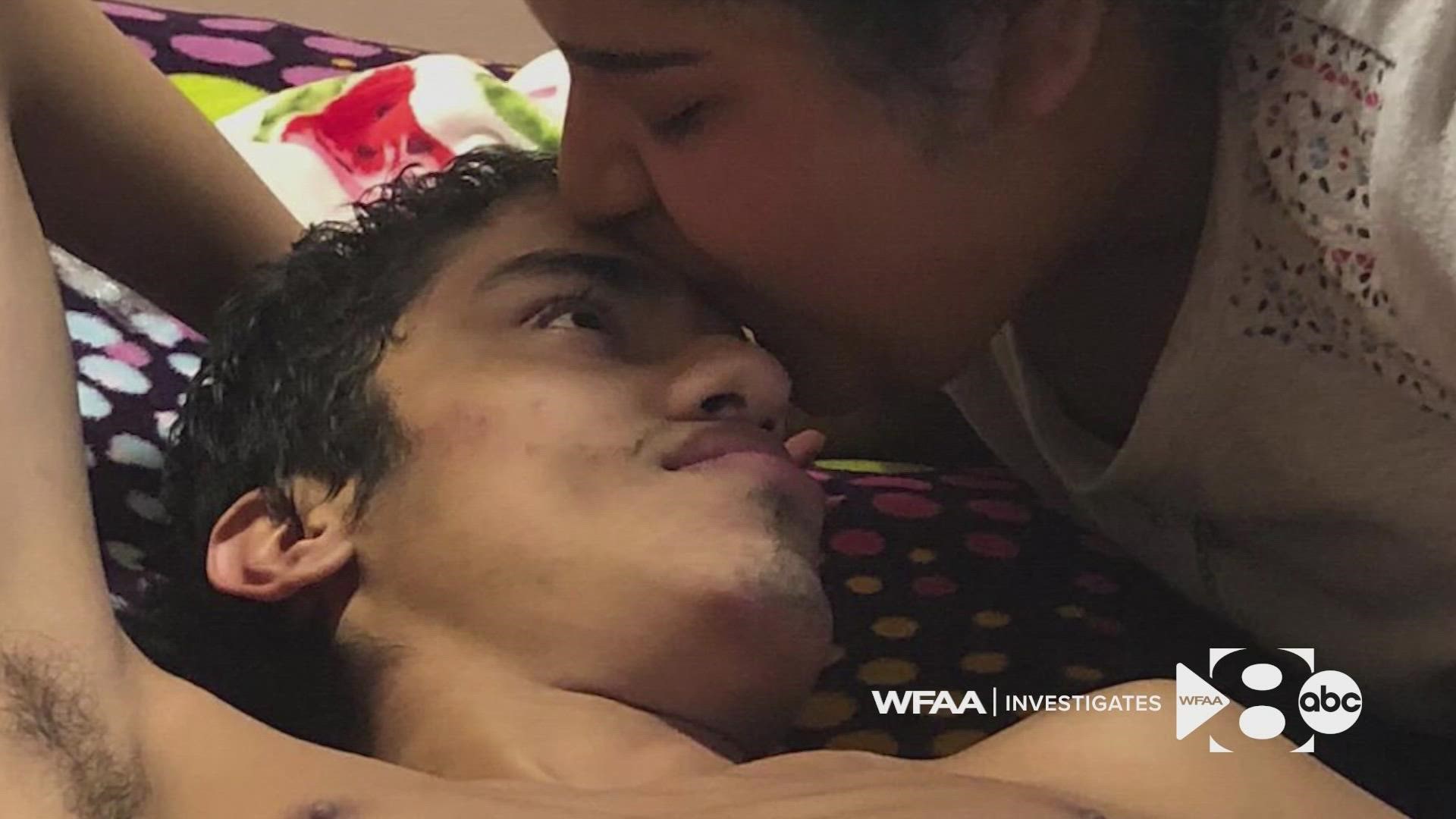DALLAS — Watch the full story on WFAA News at 10.
Like any mother of a growing boy, Maria Covarrubias spent a lot of time in the kitchen.
Her son, Raul Olguin, loved to eat.
“With me, he always wanted to eat,” she said in Spanish. “With me, always.”
Raul had the intellect of a toddler. He was severely autistic and needed constant supervision. He lived with his mother for most of his life – except for his final 71 days, when he was placed with a caregiver in a Garland home.
By the time the 24-year-old died in April 2019, an autopsy showed he weighed 85 pounds. The pathologist found that he was malnourished and that lack of food contributed to his death.

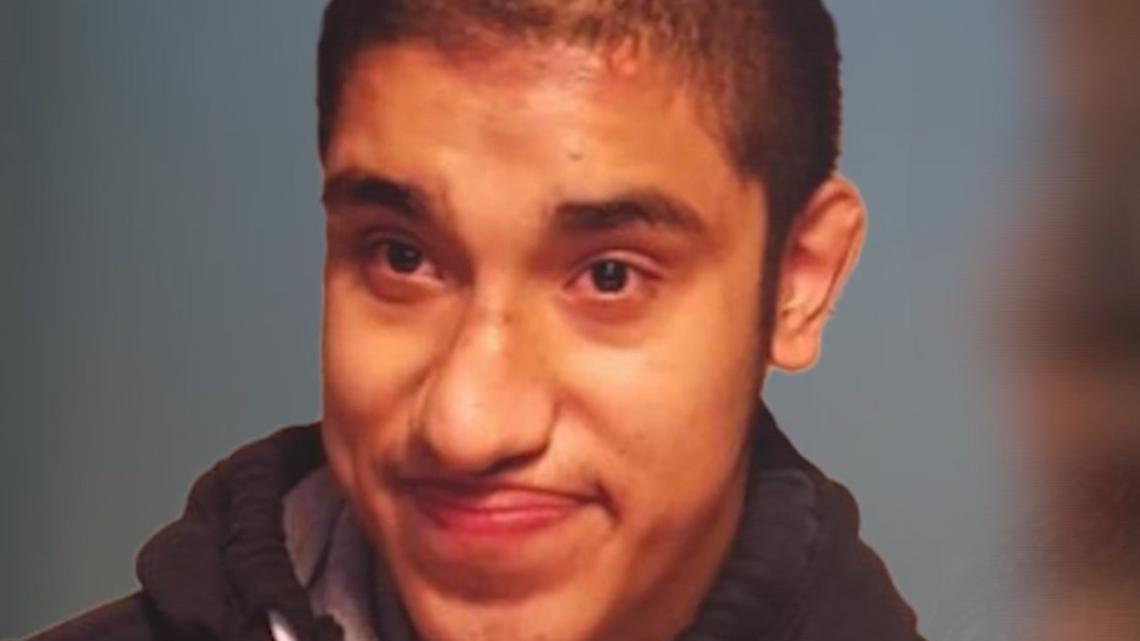
A two-year WFAA investigation into Raul’s case found his caregiver – licensed by the state – had a federal criminal conviction and should never have been looking after him or any other disabled people. The caregiver managed to make it through a loophole in Texas’ criminal background check process. Yet, another loophole allowed her to continue taking care of vulnerable individuals while under investigation for neglect, WFAA found.
“Many people failed him,” said Ana Ortiz, Raul Olguin’s former caseworker who knew him and his mother well. “Someone needs to be held accountable for what happened to him.”
The removal
In late January 2019, Raul was removed from his mother’s care. She’d been accused of neglect. Records show an investigation soon cleared her, but not before he was placed in the Garland home of Sharita Brandon.
“Mom never got to see a healthy Raul after that point,” Ortiz said.
Brandon was a caretaker working as a contractor for Paso a Paso, a company paid by the state of Texas to find and help supervise foster homes for the intellectually disabled.
Records show Paso a Paso officials periodically checked on Raul at Brandon’s home. They noted that he was losing weight, according to state records obtained by WFAA.
“The caregiver [Brandon] would say he won't eat, but when we witnessed him eating, he would gobble up his food like he had not eaten,” Paso a Paso’s program manager told state investigators looking into Raul’s death. “He inhaled his food. Raul was grabbing at the sandwich of other clients.”
The program manager told investigators that Raul “did have weight issues while under his mother's care. … but he was never under 100 pounds, and he always had an appetite.”
A Paso a Paso nurse described similar concerns. Records show she visited the house on March 25, 2019. Brandon told her that Raul would not eat his breakfast. She said she asked Brandon to bring it back out.
“A bowl of oatmeal (warmed up) was brought…,” according to an investigation into Raul’s death. "And he ate it all,” records show.
Workers at a “day hab” facility Raul attended when he lived with Brandon told state investigators that his appetite was good in the beginning. But, they said, Raul stopped wanting to eat and began losing weight rapidly.
In her interview with state investigators, Brandon reported that “Raul had bad eating habits.”
“I could not get him to eat,” Brandon told state investigators. “Raul would eat, but not like he should.” She said she notified Paso a Paso that Raul was not eating and blamed the company for not giving her the support she needed.
Arnulfo Gonzales, co-owner of Paso a Paso, said his company had a coordinator and two nurses involved in Raul’s care.
He said Paso a Paso employees are not on-site day and night to monitor foster care hosts like Brandon. “We provide them with the training we’re required to provide,” he said. “As far as what happens 24-7, it’s hard to say.”
Text messages
Raul’s mother, Maria Covarrubias, provided WFAA her text messages with Sharita Brandon.
Over and over, Covarrubias asked about Raul’s well-being. In the texts, Brandon never gave a hint she was having issue with Raul eating. In fact, her texts gave the opposite impression.
In one text, shortly after Raul came under her care, Brandon wrote: “I guess he likes chicken and shrimp alfredo.”
In a March 1, 2019, text, Brandon said, “He is doing so good. I believe he really likes it here! We just came from [Chuck E. Cheese].”
A month later, Brandon texted, “He is doing so good…. I love Raul so so sweet.” The next day, April 1, 2019, Brandon sent a photo of Raul. He appeared emaciated.
“He was always a very tall and thin young man,” Ortiz said about the picture. “But that's a completely different person. I couldn't even recognize him.”
Records show Brandon took Raul to a medical clinic three times in the days before he died. He was seen by two different nurse practitioners. Neither noted weight loss as an issue.
‘Well nourished’
On his final visit, April 8, 2019, the nurse practitioner described him as “well nourished.”
Two days after that doctor visit, Paso a Paso officials removed Raul from Brandon’s home.
On the way to the home of his new caretaker, Raul ate “chicken strips, fries and a burger,” according to state records.
His new caregiver told state investigators that, when Raul arrived at his home on the evening of April 10, he “looked very emaciated, malnourished and his bones were visible,” state records show.
The new caretaker told investigators Raul “ate everything he fed him.”
The next day, Raul collapsed in the front yard of the Dallas home. He was “vomiting black material,” according to Dallas County Medical Examiner records.
Paramedics rushed Raul to Methodist Dallas Medical Center. He was dead on arrival. Hospital records show staff checked “yes” on his paperwork that they suspected he had been neglected.
A hospital nurse stated Raul “did not appeared cared for well,” according to investigator’s notes from the medical examiner’s office.
An autopsy found the main cause of death was aspiration pneumonia. It also said that malnutrition contributed to his death. “As it is uncertain to what extent his malnutrition contributed to his death, the manner of death will be classified as undetermined,” the autopsy report states.
‘Inconclusive’
The Texas Department of Family and Protective Services investigated Raul’s death. The agency completed its investigation two years after Raul died.
The final result? “Inconclusive.”
“It could not be determined if there was a negligent act or omission,” the report stated.
Investigators cited several factors in their decision:
A day hab staff member told investigators that Brandon sent Raul to their facility with food.
A Paso a Paso staff member had seen Brandon feed Raul during their visits to her home.
Medical clinic staff had described Raul as “well nourished” when Brandon brought him for check-ups.
Gonzalez with Paso a Paso said he is unsure whether Raul was neglected, but said his company did all it could.
“To say whether I think he was neglected or abused, that is a very fine line,” he said. “I cannot really say. That’s why it involved Adult Protective Services, and let them determine that based on whatever facts they obtain.”
He said when his staff noticed Raul’s weight loss, they acted. “When we started noticing the weight loss, our nurses and coordinator conducted unannounced visits to see what they would find. They never found anything out of the ordinary,” he said.
He said doctors who saw Raul never sounded an alarm. “There was a lot of conflicting information on some of the doctor’s notes. We would see weight loss, but then on their summary, they would say ‘he’s doing great,’ ‘he’s looks great.’ He’s losing weight but he’s looking great?”
“It was one of those cases, unfortunately, they fall through the cracks,” he said. “By the time you want to do something, it’s too late.”
Clay Boatright, a disability rights advocate and father of twin daughters with severe autism, said Raul’s death is an avoidable tragedy.

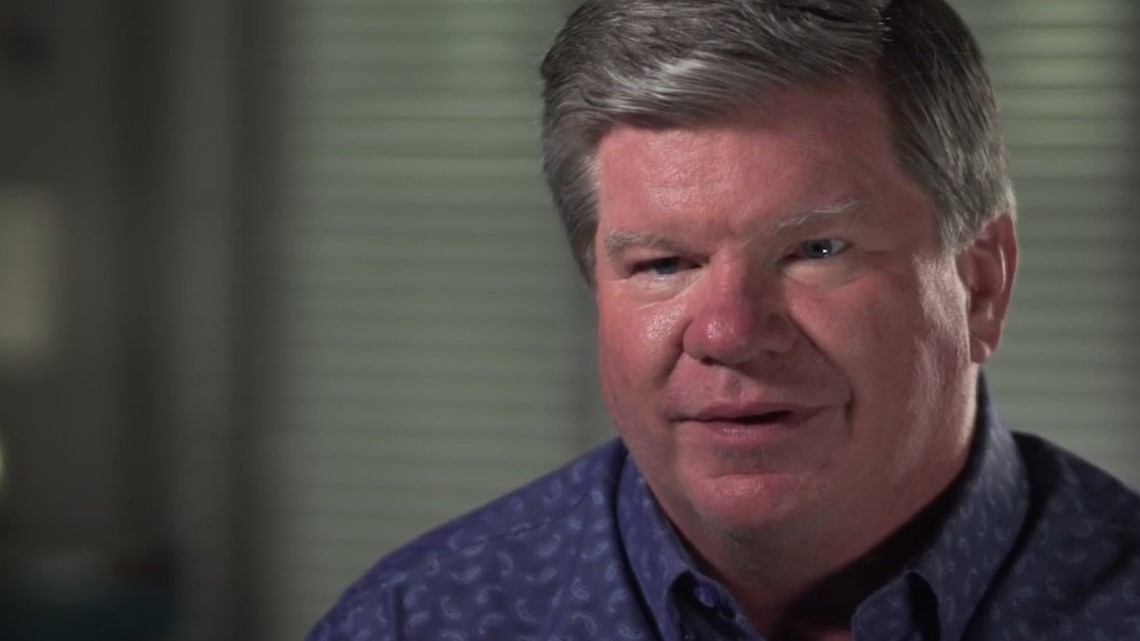
“For someone to deteriorate, and to ultimately die, in a way that people can't draw conclusion, or where there's confusion, makes absolutely no sense,” he said. “It's not like he was isolated for days and someone found him days later. People saw him every single day.”
Sharita Brandon declined to do an on-camera interview but provided WFAA videos of her feeding Raul. One video shows him eating chicken strips.
“I wasn’t there when he died,” Brandon told WFAA via text. “He walked out of my house normal.”
Brandon said she did nothing wrong in Raul’s case, and that she did all she could to get him to eat.

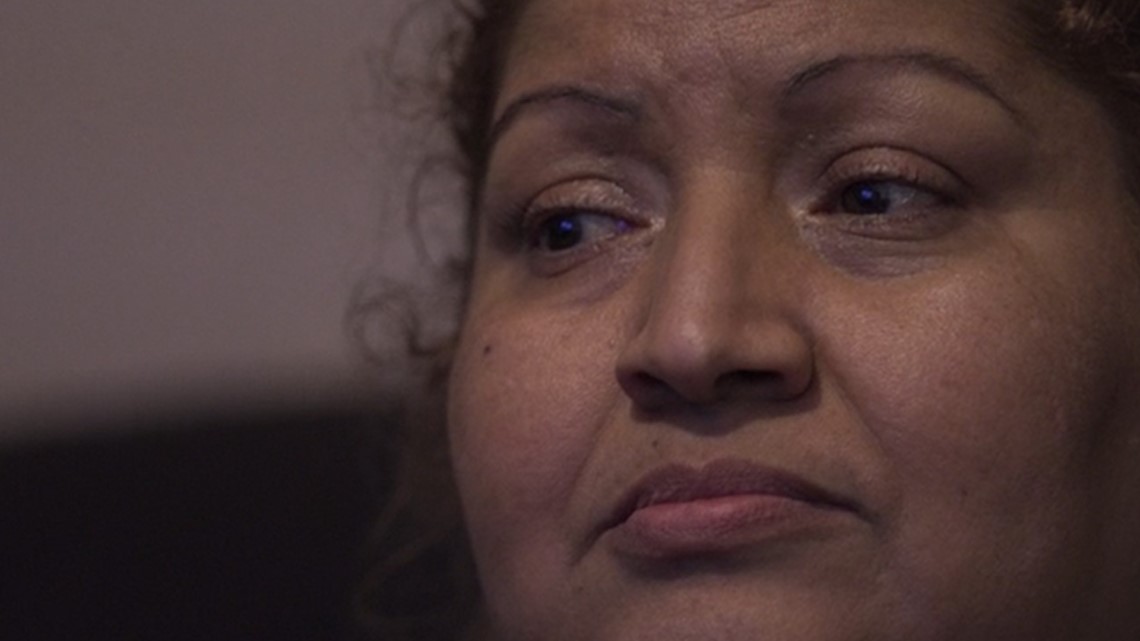
Raul’s mother said she can’t understand how Raul got into such a poor physical condition that he died the way he did.
“If he was here with me, he would have been better,” his mother said.
Criminal history overlooked
WFAA’s investigation also found that Brandon should never have been working with people like Raul.
In 2004, while living in Arkansas, she pleaded guilty to stealing money from a federal program that provided funds to the state to pay for day care for “children whose parents were receiving welfare and returning to work or school,” according to court records.
Documents in the criminal case say Brandon was a state contract worker who contacted day care providers and “solicited them to participate in submitting fraudulent vouchers” to the state. A federal judge ordered her and several accomplices to pay back more than $880,000.
Four years later, Brandon had paid $817.05, court records show. A judge revoked her supervised release after finding she violated the conditions of her release.
He sentenced her to one year and one day in prison.
Brandon later moved to Texas.
Records show that in 2016, a child care business ran a fingerprint background check on her, as required by state law. That search found her federal conviction.
But background checks done by companies taking care of intellectually disabled individuals did not. That’s because those companies were only required to check her name in the Texas Department of Public Safety’s database, which contains only convictions in Texas state courts.
Her federal conviction did not show up in there because it was in an Arkansas federal court.
“Why would you not perform (a fingerprint background check) for caregivers who are going to be working with adults who are as vulnerable as the children in daycare?” Boatright said.
The state’s 13 state-supported living centers take care of the same population of people as Raul. By state law, fingerprint background checks must be done on the employees who work there.
Checking an individual’s name in the DPS database costs $1. Having a fingerprint background check conducted costs $38.25.
“It’s a classic case of pennywise and pound foolish,” said Dennis Borel, executive director of the Coalition for Texans with Disabilities.

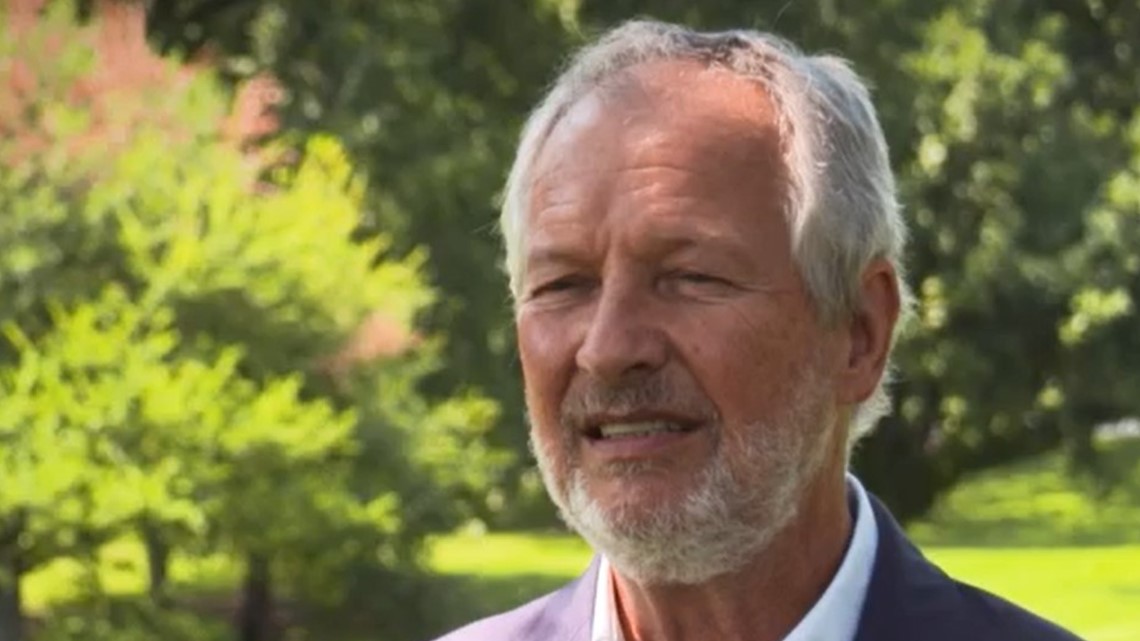
Both Borel and Boatright said the root cause of the problem is a system that is drastically underfunded. Texas typically ranks near the bottom of states in funding the system that’s supposed to help protect the intellectually and physically disabled. Borel said companies that hire caretakers have been paid virtually the same rate for years, even as costs have gone up. Caretakers, he said, can make more money working at a fast-food restaurant.
“In other words, there hasn’t been much extra money going their way,” Borel said. “So, they’ll tell you, we have to cut corners where we can because the state inadequately funds us.”
Arnulfo Gonzalez with Paso a Paso said his company performed the level of background check through Texas DPS required by state law.
“We entered her name and her date of birth, and the results we obtained was ‘no matching records.’ When we get that kind of return back, then that clears us to contract with that person,” he told WFAA. “As far as missing any other information, if that information was not in the system, I don’t know who’s at fault for that, because we go by whatever we obtain once we enter that information in that search.”
He said the state should re-evaluate the types of background checks required in his industry.
“I’m sure, just like Sharita (the caretaker), I’m sure there’s plenty of others out there that are being missed or falling through the cracks,” he said. “I think there needs to be some changes. I think a lot of lives could be saved. I think that a lot of fraud could be prevented.”
Texas Health and Human Services officials said they have no plans to make changes to the background check process, and that it is up to lawmakers to change the rules.
Last summer, months after WFAA first brought Brandon’s federal conviction to the state’s attention, the Texas Health and Human Service Commission’s Office of the Inspector General concluded Brandon “concealed” her “conviction history” from the companies that hired her to take care of the disabled.
That investigation resulted in her being barred from working with people like Raul.
Brandon told WFAA she didn’t think her conviction was relevant.
Arkansas officials told WFAA that Brandon has not paid federal restitution in more than a decade. She and her accomplices still owe more than $700,000.
WFAA has repeatedly asked Texas HHSC officials for an on-camera interview to discuss gaps in the background check process. All requests have been denied.
Another loophole
WFAA also found that for more than six months after Raul’s death – while the state investigated whether abuse or neglect was involved – Brandon continued to take care of another disabled man.
She was able to do so because there is no way under state law to prevent a caretaker under investigation for serious misconduct from taking care of the disabled.
Under current law, state regulators also have no authority to suspend a caretaker found to have abused, neglected or exploited their intellectually disabled client while they appeal that finding. (We highlighted this problem in a past story.) Two Dallas area lawmakers – State Rep. Jeff Leach (R-Plano), and Sen. Royce West (D-Dallas) – have filed bills during the last two legislative sessions attempting to give the state the power to do so. None have became law.
“Clearly, that system is set up to protect the caregiver in question,” Boatright said. “It's not set up to protect the person with a developmental disability.”
Brandon told WFAA that the other disabled man was eventually removed from her care as a result of the inspector general’s investigation into her criminal history.
In addition to Brandon being barred, one of Paso a Paso’s nurses was reprimanded for Raul’s death. An investigation found she “failed to intervene.” She was ordered to take remedial classes. When contacted by WFAA, she said she was not Raul’s primary nurse. “Just because I was the one reprimanded doesn’t mean I’m the one that had anything to do with it. [It] just means I was the last nurse to see him... I feel very bad for his mom and the whole situation...”
For Maria Covarrubias, the death of her son Raul is a loss she will never get over. She said she will never understand how the people paid to protect him failed to keep him alive.
“He would eat everything, everything,” she said through tears. “I don’t understand how this happened.”
Email investigates@wfaa.com.

